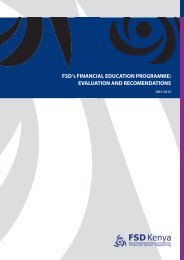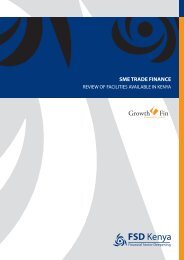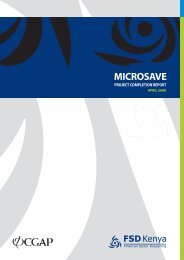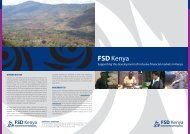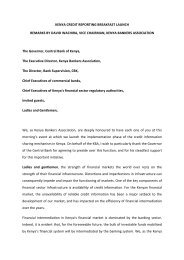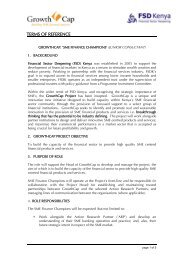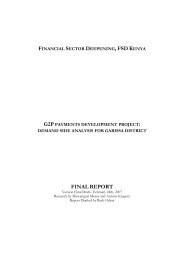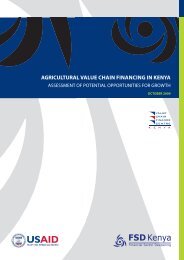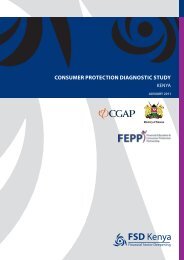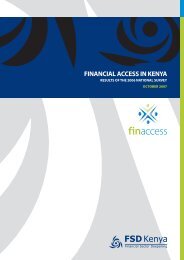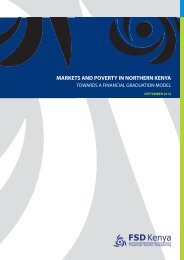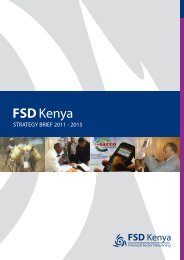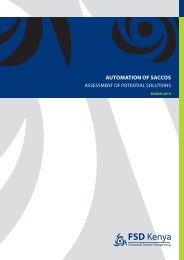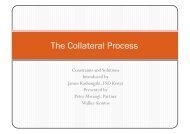2009 - FSD Kenya
2009 - FSD Kenya
2009 - FSD Kenya
Create successful ePaper yourself
Turn your PDF publications into a flip-book with our unique Google optimized e-Paper software.
expAnDing FinAnCe For growTh<br />
Small and medium sized enterprises (SMEs) form a key part of economies<br />
throughout the world. In <strong>Kenya</strong>, SMEs have the potential to contribute<br />
significantly to economic growth and poverty reduction through increased<br />
production and employment. This role has long been recognised by the<br />
Government of <strong>Kenya</strong>. Vision 2030, <strong>Kenya</strong>’s long-term development plan,<br />
places a strong emphasis on the sector. While SMEs face many constraints,<br />
the lack of appropriate financial products and services invariably appears in<br />
surveys and analysis as one the leading hurdles to realising growth.<br />
As in other areas, a broad-based approach is needed to build market driven<br />
financial solutions for the SME segments. Work in which <strong>FSD</strong> has been<br />
involved ranges from supporting policy development through research,<br />
through assisting in the development of market infrastructure such as credit<br />
bureaus to building sustainable capacity at the retail level through a series of<br />
action research projects with financial sector players.<br />
Box 3: Key findings from a study into the cost of collateral<br />
<strong>FSD</strong> KENYA <strong>2009</strong> ANNUAL REPORT • 21<br />
<strong>FSD</strong> <strong>Kenya</strong> in partnership with the Central Bank of <strong>Kenya</strong> and the <strong>Kenya</strong> Bankers Association commissioned ShoreBank International Ltd and Walker Kontos Advocates<br />
to identify and document the collateral process and determine the costs associated with each step involved in <strong>Kenya</strong>. The main findings are summarised below:<br />
The following constraints inhibit the efficient operation of the collateral system in <strong>Kenya</strong>:<br />
Lack of a uniform code of regulations.<br />
Multiplicity of registries which are manual, inefficient, uncoordinated and inconclusive.<br />
Slow judicial procedures which have been a major hindrance to lenders’ ability to raise security.<br />
Over reliance by lenders on the traditional all asset debenture and legal mortgages at the expense of less costly and more innovative financial products.<br />
The study contained the following recommendations:<br />
Research efforts<br />
Effective engagement starts with a clearer understanding of the market and<br />
the specific constraints to SME finance in <strong>Kenya</strong>. <strong>FSD</strong>’s GrowthFin programme<br />
has supported a wide ranging programme of research into issues impacting on<br />
SME finance. This year saw two new research efforts initiated. The first, a study<br />
of the demand side constraints for SME insurance will illuminate the major<br />
factors that hinder the uptake of insurance. Without adequate insurance the<br />
SME sector is exposed to major risks from theft, fire and flood damage. This<br />
study is being conducted under the auspices of the Private Sector Development<br />
Strategy (PSDS) Secretariat and forms part of <strong>FSD</strong>’s commitment to support<br />
the implementation of the PSDS. It is expected that the study will be complete<br />
in early 2010. Work on a comprehensive examination at the costs of taking<br />
collateral in <strong>Kenya</strong> - the second new study commissioned - was completed<br />
during the year. The results of study undertaken in partnership with the <strong>Kenya</strong><br />
Bankers Association and the Central Bank of <strong>Kenya</strong> were enthusiastically received<br />
Creation of security interests Perfection of security interests Enforcement<br />
Establish a unified code of law for immovable<br />
property<br />
Reform of the Stamp Duty Act Strengthen out of court system of repossession<br />
Reform of land tenure system Combine multiplicity of registries to single<br />
Use of alternative dispute resolution mechanisms<br />
registry<br />
which obligate fulfilment of contractual<br />
obligations<br />
Repeal of the land control act Increase in number of specialised commercial<br />
courts<br />
Establish personal security legislation Strengthen alternative products such as hire<br />
purchase, leasing, factoring and warehouse<br />
receipts<br />
Reform of corporate security instruments<br />
Reform of floating charges<br />
Development of a credible credit information<br />
sharing system



